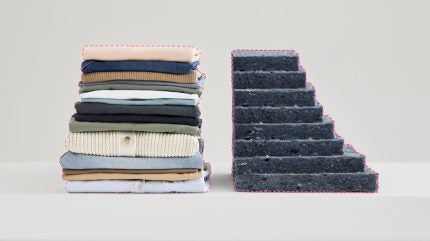
This no-cost cotton circularity programme was originally introduced in 2022 by Cotton Council International and Cotton Incorporated.
The UK not-for-profit initiative builds upon the US Cotton campaign known as Blue Jeans Go Green, which has been operational since 2006. The US campaign has successfully recycled more than 5.6m pairs of jeans and kept over 2,832 tonnes of denim from ending up in landfills.

Discover B2B Marketing That Performs
Combine business intelligence and editorial excellence to reach engaged professionals across 36 leading media platforms.
Among the participants in the Cotton Lives On recycling programme are notable UK fashion brands and retailers like Anthropologie, Bianca Saunders, Charles Tyrwhitt, Hush, Hobbs, L’Estrange, Me+Em, Nexvision, Paige, and Whistles.
The recycling process involves collecting garments that are composed of at least 85% cotton. These items undergo sorting to remove buttons, zips, and other hardware before they are sent to a facility specialised in transforming natural cotton fibres.
Cotton Lives On collaborates with Naturalmat, a Devon-based natural bedding manufacturer. Once converted into non-woven pads, these materials are supplied to Naturalmat to produce roll mats.
These mattresses are then distributed through partnerships with UK charities such as Shelter and Single Homeless Project for individuals at risk of homelessness.

US Tariffs are shifting - will you react or anticipate?
Don’t let policy changes catch you off guard. Stay proactive with real-time data and expert analysis.
By GlobalDataAnnually in the UK alone £140m ($185.57m) worth of clothing ends up in landfills. In 2021 about 711,000 tonnes of used textiles were thrown away in household bins or general waste containers at Household Waste Recycling Centres.
On a global scale, approximately 88% of textiles either end up in landfills or are incinerated each year.
To date, nearly 8,000kg of cotton has been gathered by Cotton Lives On initiative which has led to the creation and donation of around 100 roll mats.
Cotton Incorporated senior vice president Kim Kitchings said: “We are thrilled to see so much interest and participation in the Cotton Lives On recycling programme for 2025. By joining the programme, fashion brands, retailers and consumers can help keep cotton’s circularity going by diverting cotton waste from landfill, while also helping people at risk of homelessness by providing them with a roll mat made from the recycled cotton.”





